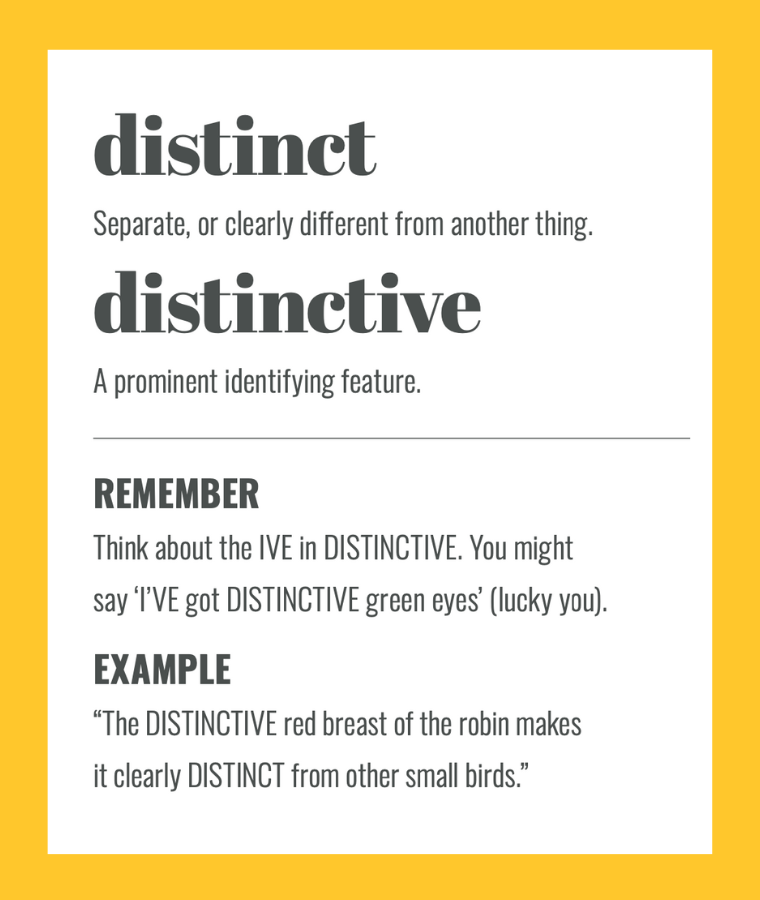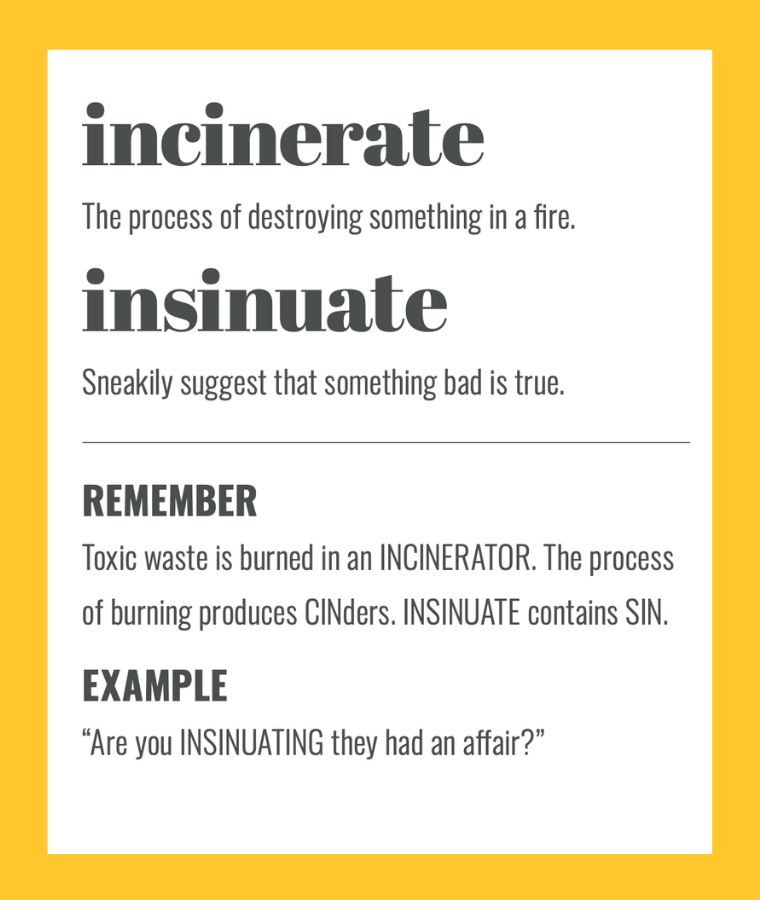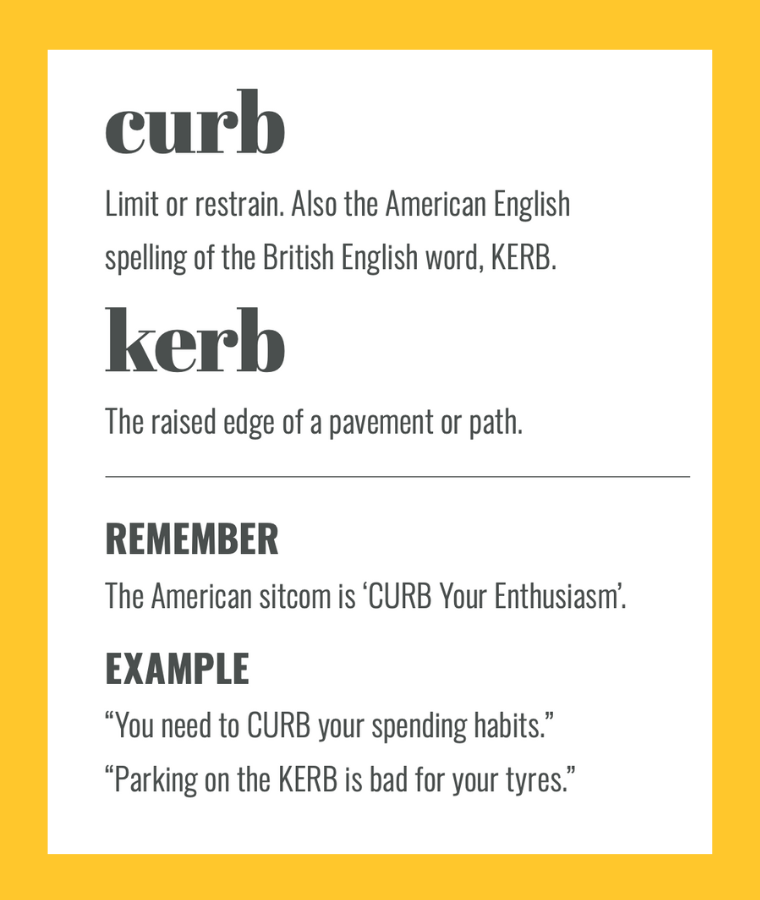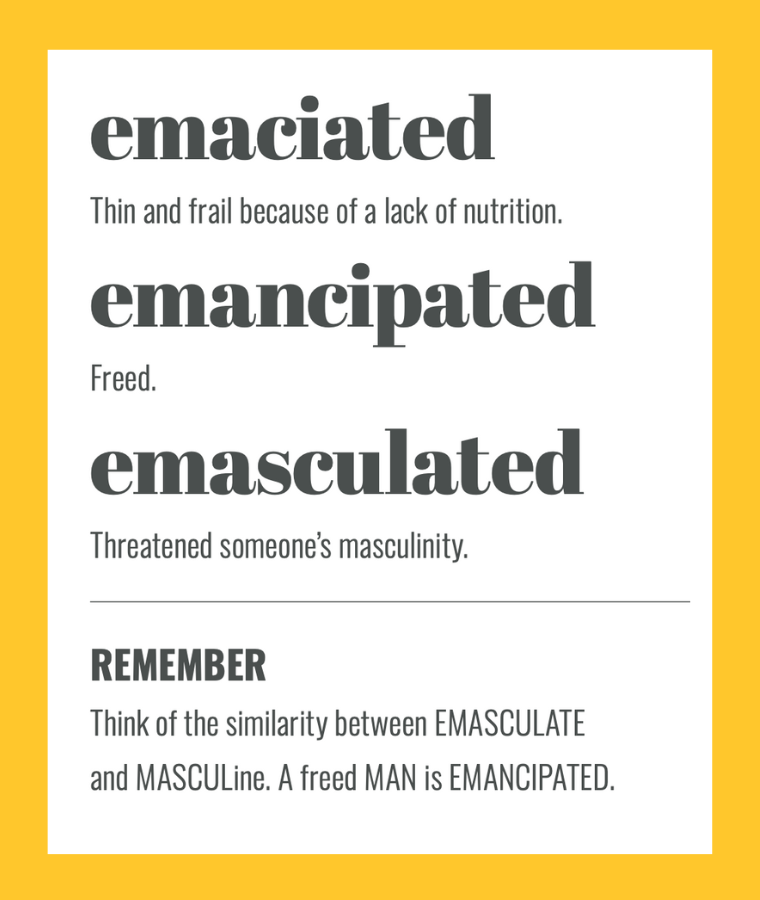DISTINCT vs DISTINCTIVE: simple spelling tips to remember the difference

The words DISTINCT and DISTINCTIVE are often confused because they’re so similar – but their meanings are different. Read on to learn the difference between these similar words.
Here are my simple tips to remember the difference between DISTINCT and DISTINCTIVE.
When to use DISTINCT
DISTINCT is an adjective meaning separate, or clearly different from another thing.
You can use DISTINCT in a sentence like this:
“There’s a DISTINCT difference between apples and oranges.”
OR
“The awards cover many DISTINCT categories of filmmaking.”
When to use DISTINCTIVE
DISTINCTIVE is an adjective referring to a prominent identifying feature.
You can use DISTINCTIVE in a sentence like this:
“I’d recognise her DISTINCTIVE accent anywhere.”
OR
“Monet’s paintings have a DISTINCTIVE style.”
This sentence shows the difference between DISTINCT and DISTINCTIVE in use:
“The DISTINCTIVE red breast of the robin makes it clearly DISTINCT from other small birds.”
Pro tip
To remember the difference, think about the IVE in DISTINCTIVE. You might say ‘I’VE got DISTINCTIVE green eyes’ (lucky you).
I hope these tips help you remember the difference between DISTINCT and DISTINCTIVE in future!
Get more tips in The Little Book of Confusables
Fun, memorable spelling tips for 600 confusing words, packed into 300+ gorgeous pages: just £11.95.
You’ll wonder how you managed without it!
GOLD award winner: 2023 eLit book awards/Distinguished Favorite: 2023 NYC Big Book Awards.
INCINERATE vs INSINUATE: top tips to help you remember the difference

The words INCINERATE and INSINUATE are easy to confuse because they sound similar – but that doesn’t mean they can be used interchangeably! Read on to remember the difference between these two commonly confused words.
Here are my simple tips to remember the difference between INCINERATE and INSINUATE.
When to use INCINERATE
INCINERATE is a verb describing the process of destroying something in a fire.
You can use INCINERATE in a sentence like this:
“Quick! INCINERATE any incriminating evidence!”
OR
“All of our rubbish gets INCINERATED.”
When to use INSINUATE
INSINUATE is a verb meaning to sneakily suggest that something bad is true.
You can use INSINUATE in a sentence like this:
“Are you INSINUATING they had an affair?”
OR
“I’m sorry – I didn’t mean to INSINUATE you cheated on the exam.”
This sentence shows the difference between INCINERATED and INSINUATED in use:
“The police INSINUATED that the criminals had INCINERATED the evidence.”
Pro tip
To remember the difference, remember that toxic waste is burned in an INCINERATOR. The process of burning produces CINders while INSINUATE contains SIN – something that’s often INSINUATED.
I hope these tips help you remember the difference between INCINERATE and INSINUATE in future!
Get more tips in The Little Book of Confusables
Fun, memorable spelling tips for 600 confusing words, packed into 300+ gorgeous pages: just £11.95.
You’ll wonder how you managed without it!
GOLD award winner: 2023 eLit book awards/Distinguished Favorite: 2023 NYC Big Book Awards.
CURB vs KERB: top tips to help you remember the difference

The words CURB and KERB are easy to confuse because they sound the same – but that doesn’t mean they can be used interchangeably! Read on to remember the difference between these two confusing words.
Here are my top tips to learn the difference between CURB and KERB.
When to use CURB
CURB means limit or restrain. It’s also the American English spelling of the British English word, KERB – meaning the edge of a pavement (or sidewalk).
You can use CURB in a sentence like this:
“CURB your spending habits before you get into debt!”
OR
“Avoid hitting the CURB when you park!”
When to use KERB
KERB is a noun and the American English spelling of the British English word, CURB. It describes the raised edge of a pavement or path.
You can use KERB in a sentence like this:
“Parking on the KERB is bad for your tyres.”
OR
“Learner drivers often hit the KERB.”
Pro tip
To remember the difference, think of the popular American sitcom CURB Your Enthusiasm.
I hope these tips help you remember the difference between CURB and KERB in future!
Get more tips in The Little Book of Confusables
Fun, memorable spelling tips for 600 confusing words, packed into 300+ gorgeous pages: just £11.95.
You’ll wonder how you managed without it!
GOLD award winner: 2023 eLit book awards/Distinguished Favorite: 2023 NYC Big Book Awards.
EMACIATED vs EMANCIPATED vs EMASCULATED: simple tips to remember the difference

The words EMACIATED, EMANCIPATED and EMASCULATED are easy to confuse because they look and sound similar – yet their meanings are very different! Read on for how to remember the difference between these confusing words.
Here are some simple tips to remember the difference between EMACIATED, EMANCIPATED, and EMASCULATED.
When to use EMACIATED
EMACIATED is an adjective that means thin and frail because of a lack of nutrition.
You can use EMACIATED in a sentence like this:
“The remaining survivors were EMACIATED.”
OR
“The stray cat was EMACIATED when we rescued it.”
When to use EMANCIPATED
EMANCIPATED is an adjective that means being free.
You can use EMANCIPATED in a sentence like this:
“She EMANCIPATED herself from her parents’ care aged 15.”
OR
“The slaves were EMANCIPATED at the end of the 19th century.”
When to use EMASCULATED
EMASCULATED is an adjective meaning made weaker or less effective, or deprived of masculinity.
You can use EMASCULATED in a sentence like this:
“The committed was EMASCULATED by local politics.”
OR
“While he’d never admit it, he felt EMASCULATED by her success.”
Pro Tip
To remember the difference between these confusing words, think of the similarity between EMASCULATE and MASCULine – and the fact that a freed MAN is EMANCIPATED.
I hope these tips help you remember the difference between EMACIATED, EMANCIPATED and EMASCULATED in future!
Get more tips in The Little Book of Confusables
Fun, memorable spelling tips for 600 confusing words, packed into 300+ gorgeous pages: just £11.95.
You’ll wonder how you managed without it!
GOLD award winner: 2023 eLit book awards/Distinguished Favorite: 2023 NYC Big Book Awards.
EMIGRATE vs IMMIGRATE: simple spelling tips to remember the difference

The words EMIGRATE and IMMIGRATE are easy to confuse because they sound so similar. They’re often used interchangeably – but their meanings are opposite! Read on to learn how to remember the difference between these commonly confused words.
Here are my top tips to remember the difference between EMIGRATE and IMMIGRATE.
When to use EMIGRATE
EMIGRATE is a verb that means to leave a country to live in another.
You can use EMIGRATE in a sentence like this:
“Lots of people EMIGRATE to Spain when they retire.”
OR
“My parents want to EMIGRATE to somewhere warmer.”
When to use IMMIGRATE
IMMIGRATE is a verb that means to come to another country to live. It means the opposite of EMIGRATE.
You can use IMMIGRATE in a sentence like this:
“Lots of people IMMIGRATE to Europe for the weather.”
OR
“I’ll need to IMMIGRATE to Canada for the new role.”
This sentence shows the difference between EMIGRATE and IMMIGRATE in use:
“My grandpa EMIGRATED from Ireland in the 1920s and IMMIGRATED to America to find work.”
Get more tips in The Little Book of Confusables
Fun, memorable spelling tips for 600 confusing words, packed into 300+ gorgeous pages: just £11.95.
You’ll wonder how you managed without it!
GOLD award winner: 2023 eLit book awards/Distinguished Favorite: 2023 NYC Big Book Awards.

